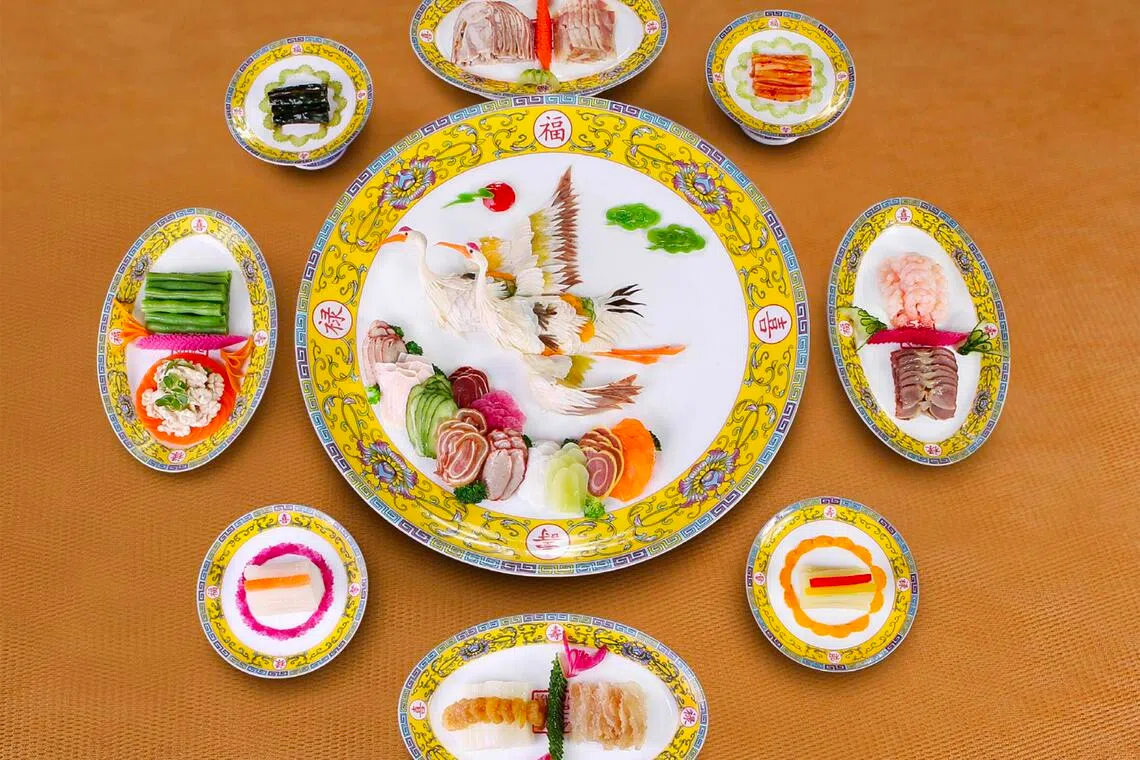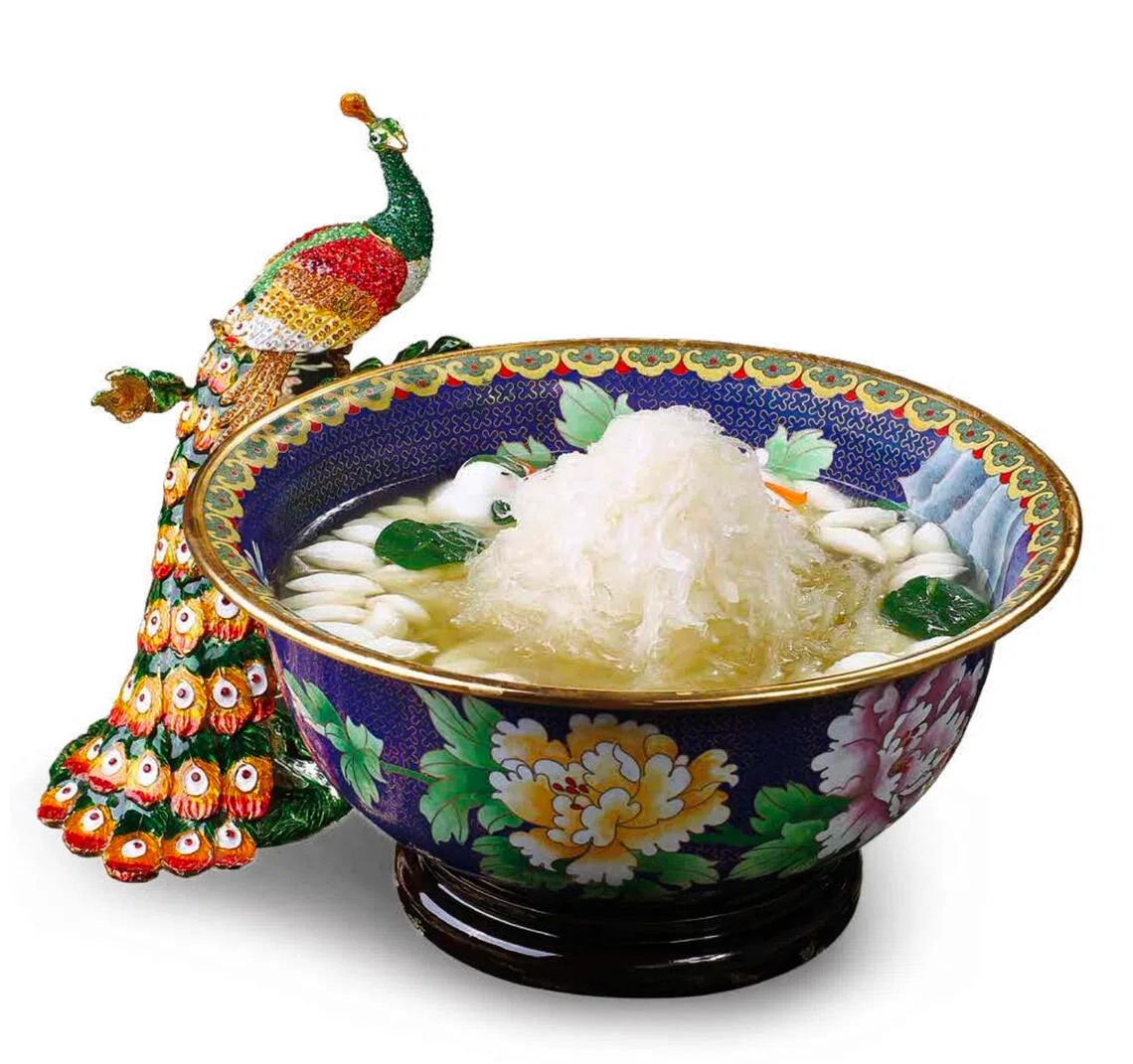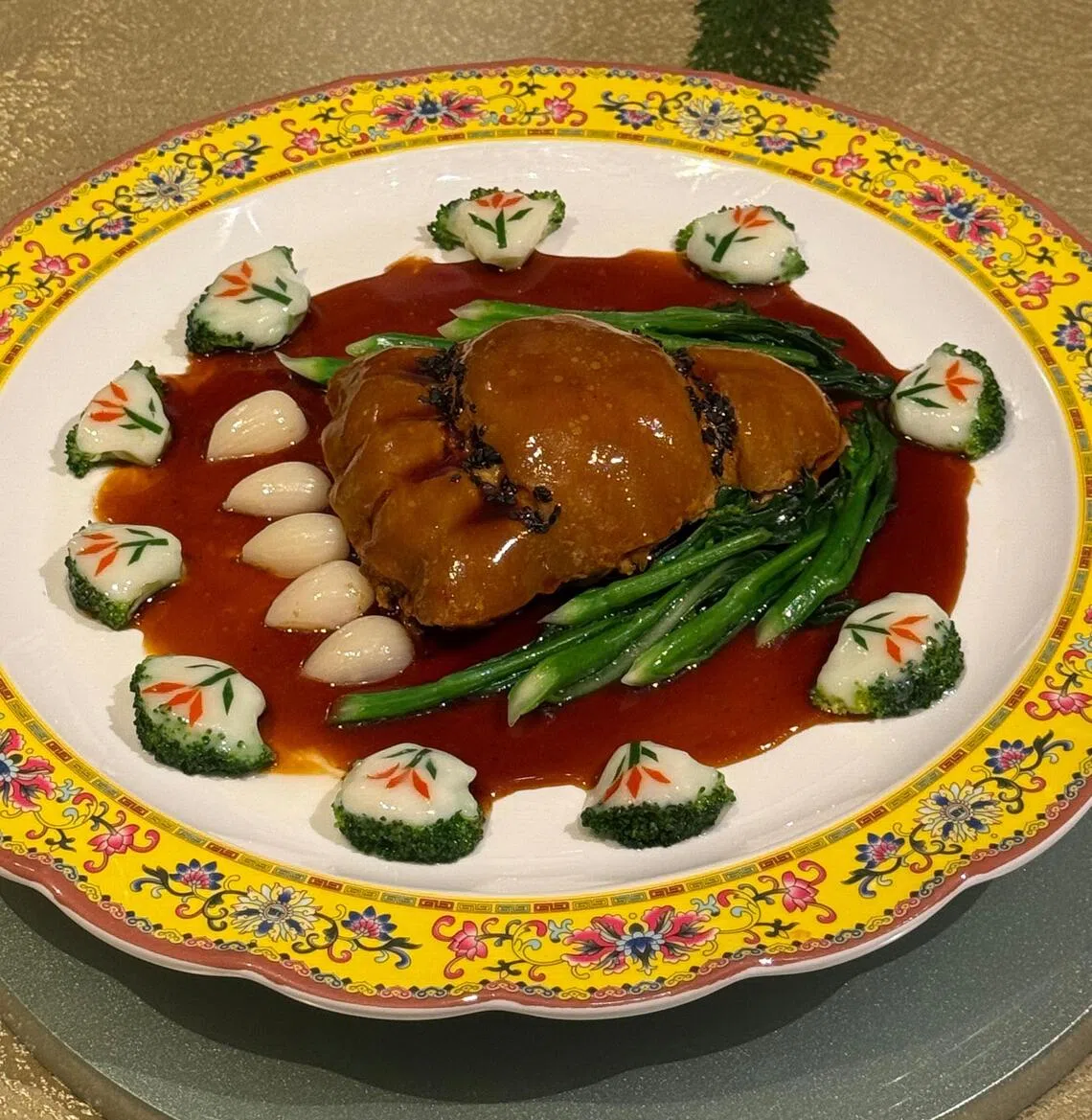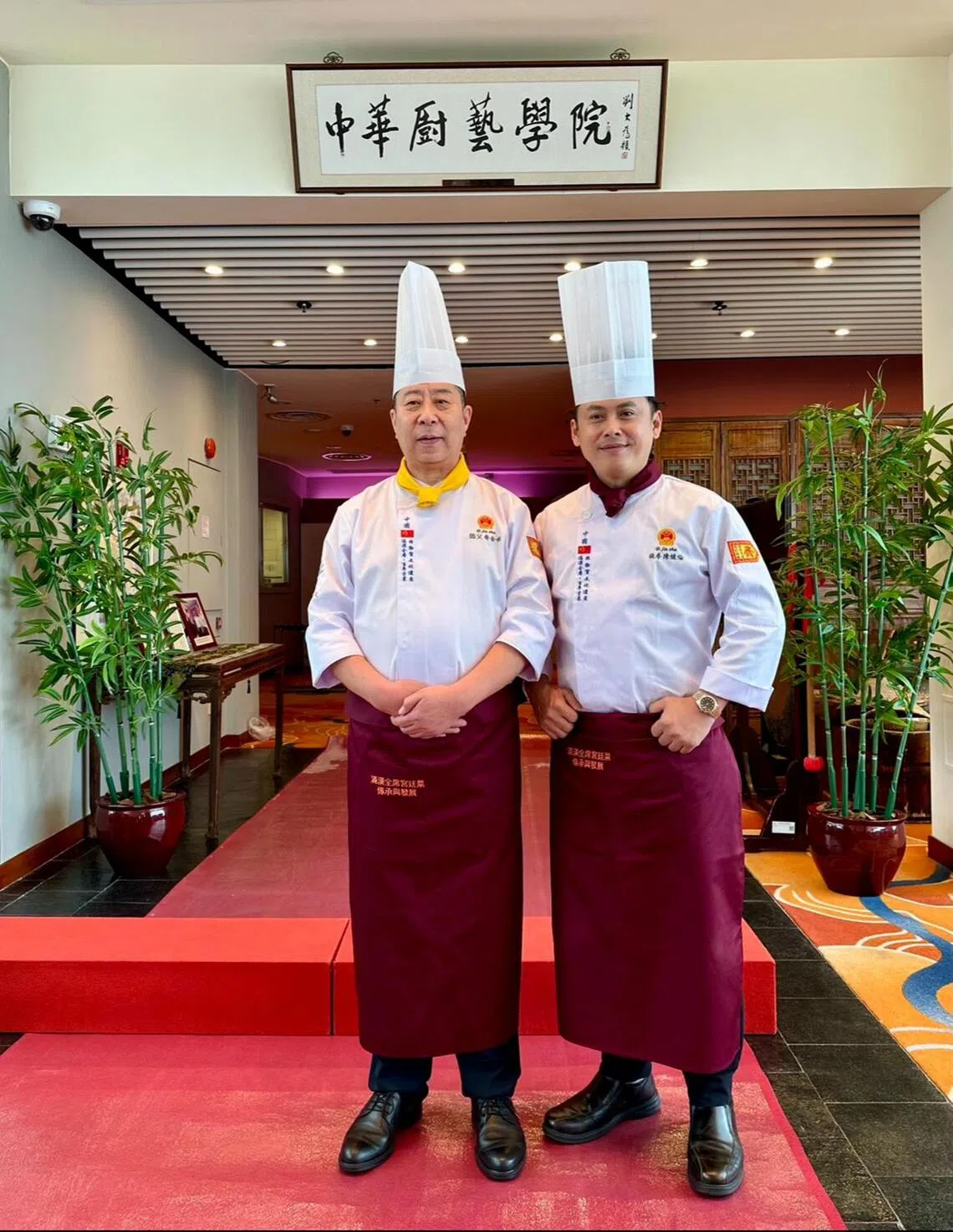Man Fu Yuan offers a taste of imperial dining with its interpretation of a Manchu-Han banquet
Sign up now: Get ST's newsletters delivered to your inbox

The Main Cold Plate comprises appetisers such as Braised Duck Gizzard, Beef Shank, Wasabi Pork Tripe Slices and Fragrance Flower Mushroom.
PHOTO: MAN FU YUAN
Follow topic:
- InterContinental Singapore's Man Fu Yuan will host a Manchu-Han banquet on Nov 8 and 9, costing $588++ a person.
- Executive Chinese chef Aaron Tan learnt about imperial cuisine traditions from Beijing-based master chef Qi Jinzhu.
- The scaled-down 40-dish feast aims to convey the banquet's history and artistry, with Qing-era costumes and storytelling.
AI generated
SINGAPORE – Opulent palace feasts have long fascinated audiences, from recent South Korean drama Bon Appetit, Your Majesty, to Chinese serials such as Delicacies Destiny (2022) and Royal Feast (2022).
Now, closer to home, diners can have a taste of imperial grandeur when InterContinental Singapore’s Cantonese restaurant Man Fu Yuan stages an eight-course Manchu-Han banquet of over 40 dishes on Nov 8 and 9.
The five-hour dinner feast, priced at an eye-watering $588++ a person, will be led by executive Chinese chef Aaron Tan and his mentor, Beijing-based master chef Qi Jinzhu. The event is an interpretation of the Manchu-Han Imperial Feast, complete with music performances and calligraphy to evoke the courtly splendour of the Qing Dynasty.
For chef Tan, 44, the banquet is the fulfilment of a long-held dream.
He recalls being captivated as a teenager by the 1995 Hong Kong film The Chinese Feast, which featured elaborate dishes from the legendary banquet. “I rewatched the movie on videotape about 10 times,” he says. “The culinary artistry captured my imagination, and I felt it would be the greatest honour to one day prepare such an extraordinary feast.”
That fascination stayed with him through decades of kitchen work. He started cooking at age 11 in his home town of Tanjung Piandang, Perak, as a zi char restaurant kitchen helper to supplement his family’s modest income.
He came to Singapore in 2001 to work in a Cantonese restaurant. In 2007, he switched to Western cuisine, joining a catering group before moving to the then Conrad Centennial Singapore, where he rose to the position of chef de cuisine. He returned to Cantonese fine dining in 2019, when he joined InterContinental Singapore as executive sous chef of Man Fu Yuan.
Over the years, he asked senior Chinese chefs to teach him the traditions of the imperial feast – in vain. He finally succeeded in 2023, when he met Chinese master chef Qi in Sarawak, where they were both judging a culinary competition.
Master chef Qi, 71, is a disciple of the late master Tang Keming, a successor of the Manchu-Han banquet tradition who had apprenticed with an imperial chef of the Qing court.
He has spent more than five decades studying and preserving imperial cuisine. He published a book in 2017, titled The Inheritance And Innovation Of Palace Dishes, which chronicles recipes and dishes from the Manchu-Han feast.
“The Manchu-Han banquet is not something most chefs want to do because it is too complex. But I really wanted to learn,” says chef Tan. “Master chef Qi recognised my sincerity and passion, and eventually formally accepted me as a disciple in June 2024.”
Modern interpretation
For master chef Qi, the banquet represents more than food. “The Manchu-Han banquet is a cultural treasure,” he says in Mandarin. “I feel a deep responsibility to keep this tradition alive. It is not just cooking, but also an art form that combines history, culture and culinary technical mastery. If the knowledge is lost, part of our heritage would vanish with it.”
He says a proper Manchu-Han Imperial Feast comprises 108 hot dishes, 60 cold dishes and 72 dishes of noodles, desserts and soups – 240 in total.
For the Man Fu Yuan event, the two chefs will present a truncated version of over 40 dishes that represent the diversity, artistry and symbolism of the tradition.
Master chef Qi notes the challenge of adapting imperial cuisine for the modern diner: “In the past, the banquet featured over 38 rare wildlife ingredients – tiger kidney, bear paw, leopard, pangolin and monkey brain, among others. Today, these are no longer permitted or ethical. Instead, we respect the spirit of the dish while substituting sustainable, high-quality alternatives.”
“Authenticity is about the spirit, not blind replication,” he adds, having staged several such banquets across China and Hong Kong. “Every dish is edible art. It is not only about food, but also about the ambience, the tableware of gold, bronze and crystal, and the sense of ceremony.”
While Man Fu Yuan restaurant is experienced in Cantonese fine dining, staging a five-hour imperial feast with over 40 staff members is on another scale altogether.
Operations manager Anson Teck, 37, says: “It is certainly ambitious – both in scale and in the intricate preparation required. But it is precisely this ambition that allows us to bring such a rare cultural experience to life.
“The cost reflects the exceptional quality of ingredients, the scale of preparation and the craftsmanship involved. For us, it is also about setting a benchmark for culinary storytelling.”
Each of the two evenings can accommodate 70 guests. The first night is fully booked.
Chef Tan and his kitchen team of 19 started practising the dishes in March. “Preparation of the ingredients will start a month before the dinner,” he says. “Some components, like dried abalone, require soaking for six days and braising for 24 hours.”
He singles out the Kun Lun Abalone as especially challenging. Each South African dried abalone, aged at least three years, costs $55. “The abalones must be soaked, braised and steamed in stages over seven days, using premium ingredients like pork belly, chicken feet and Jinhua ham. Control and precision are critical,” he says.
Each abalone is halved and stuffed with dried giant grouper skin sourced from Shenzhen. The grouper must weigh at least 300kg to ensure a thick-enough skin. One piece of dried grouper skin, weighing 12kg, costs $6,500.
To rehydrate the skin, it is soaked in iced water for five days, then steamed in intervals until soft enough for the scales to be removed by hand.
Another showpiece is The Phoenix Returns To The Nest, a double-boiled bird’s nest with chicken mousse, Jinhua ham and white fungus. The delicate chicken mousse requires 18 minutes of whisking chicken paste, which involves three chefs whisking by hand for a few minutes each, rotating to prevent fatigue.

The Phoenix Returns To The Nest features bird’s nest and a delicate hand-whipped chicken mousse.
PHOTO: MAN FU YUAN
Equally elaborate is the imitation Orchid Bear Paw. Pork skin is used to replicate the gelatinous exterior, while minced pork and tendon form the interior.

Orchid Bear Paw is made using pork skin, minced pork and pork tendon.
PHOTO: MAN FU YUAN
Courtly evening
For the evening, the service crew will don Qing-era costumes. No detail is overlooked. The chinaware, ordered from China, costs about $14,000. The dishes will be plated to match the photos in master chef Qi’s book.
Chef Tan also borrowed seven vintage dragon stands from Red Star Restaurant’s co-owner, chef Hooi Kok Wai, who bought them from Hong Kong decades ago. Each stand can hold four dishes and will be used for serving the second course of the banquet.
“I want guests to experience the banquet at a reasonable price,” says chef Tan. “In Hong Kong, they charge HK$8,800 (S$1,460) a diner. Here, we priced it at $588++ because we want to make it accessible.”
He adds: “For me, the Manchu-Han Imperial Feast represents the pinnacle of Chinese cuisine. It is like climbing a mountain. Every detail must be perfect because the dishes were meant for the emperor.”
Dishes will be accompanied by storytelling from chef Tan and master chef Qi to convey the history and meaning.

Master chef Qi Jinzhu (left) and executive Chinese chef Aaron Tan will jointly lead the staging of a modern interpretation of the Manchu-Han Imperial Feast at InterContinental Singapore’s Man Fu Yuan on Nov 8 and 9.
PHOTO: COURTESY OF AARON TAN
Beijing-based historian Thomas David DuBois, 54, is a professor of humanities at Beijing Normal University and author of China In Seven Banquets: A Flavourful History. He tells The Straits Times in an e-mail: “People remain endlessly fascinated by the lives of China’s emperors and the secluded world of the imperial court. The Manchu-Han feast is an entry point into the world of formal court protocol that underpinned the Qing court’s vast diplomatic network.
“Preservation requires rigid adherence to historical accuracy, but given the many gaps in the record, true authenticity is unattainable. What’s far more healthy and exciting is an event that allows chefs the creative space to reinterpret and reimagine the essence of the cuisine.”
Book it/Manchu-Han Imperial Feast
Where: Man Fu Yuan, Level 2 InterContinental Singapore, 80 Middle Road sinhbmanfuyuan.manfuyuan@ihg.com
When: Nov 8 and 9, 5.30 to 10.30pm
Admission: $588++ a diner
Info: For reservations, call 6825-1008 or e-mail


